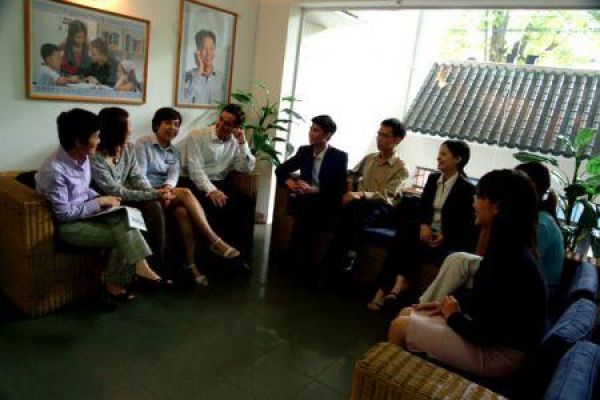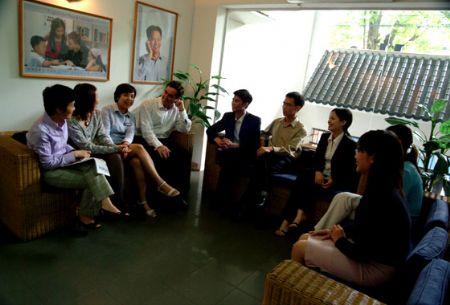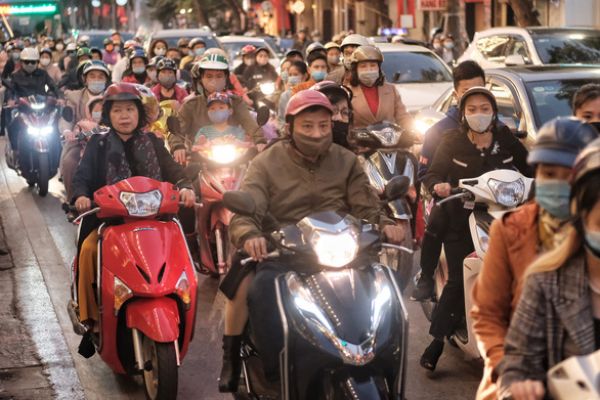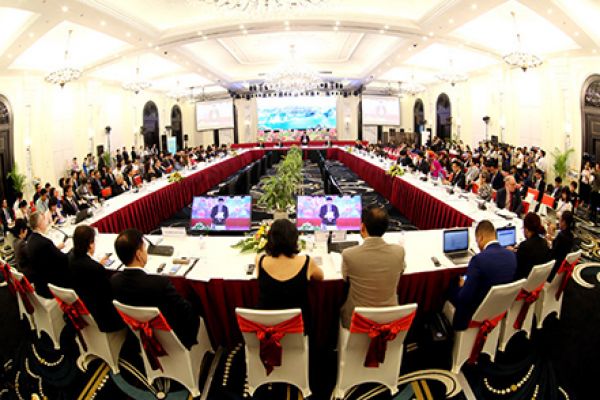
Vietnamese culture seriously concerns with status (obtained with age and education). The Vietnamese sometimes appear to answer "yes" (dạ) to all questions. However, the way of saying yes is quite polite "Yes, I am listening," "Yes, I am confused," or "Yes, I do not want to offend." "Thua" (meaning please) is added in front of the first name to show respect.
 To address people, formally, you always see Vietnamese people use Mr. or Ms. or a title plus the first name. Traditionally, Vietnamese greet each other by joining hands and bowing slightly. However, in big cities, some men have adopted the Western practice of shaking hands. In public, men often hold hands as an expression of friendship. Hugging, nevertheless, is reserved for relatives. You rarely see a Vietnamese woman shaking hands with other or with a man.
To address people, formally, you always see Vietnamese people use Mr. or Ms. or a title plus the first name. Traditionally, Vietnamese greet each other by joining hands and bowing slightly. However, in big cities, some men have adopted the Western practice of shaking hands. In public, men often hold hands as an expression of friendship. Hugging, nevertheless, is reserved for relatives. You rarely see a Vietnamese woman shaking hands with other or with a man.
Displays of respect
The respect is the corner-stone of interpersonal relationships in Vietnamese society. Normally, respect is conveyed by the use of special terms of address and certain stylistic devices. Yet, it is also expressed by nonverbal behavior. For example, a Vietnamese student who sits quietly and listens attentively to the teacher wants to express respect to his teacher. This behavior has often been misinterpreted by the American teacher as passivity and non-responsiveness.
It is also out of respect that the Vietnamese student avoids eye contact with his teacher when speaking or being spoken to. By American standards, a person acting in this way would appear suspicious, unreliable, or mischievous. In Vietnamese culture, however, looking into somebody's eyes usually means a challenge or an expression of deep passion.
The smile, which is sometimes enigmatic to the American observer, is another nonverbal symbol conveying the feeling of respect in Vietnamese culture. It should be noted that for certain feelings, Vietnamese culture prefers non-verbal communication while American culture is more inclined to use verbal expression. It is used as an expression of apology for a minor offense, for example, a late coming to class or an expression of embarrassment when committing an innocent blunder. For the Vietnamese, the smile is a proper response in most situations when verbal expression is not needed or not appropriate. It is used as a substitute for "I'm sorry", "Thank you" or "Hi!" instead of a ready yes to avoid appearing over-enthusiastic.
Beside, teachers never say thanks to their students for a small service, such as closing the window or passing the books around. A smile will do in this case. The person who gives a compliment never expects a "thank you" in return. In Vietnamese culture, a verbal expression of thanks in this case refers to a lack of modesty from the person who receives the compliment. In this case, a smile or a blush in the face is the proper response to a compliment. If a verbal response is necessary, he or she would deny the compliment by saying that he or she does not deserve it. Due to the difference in the way to express the feelings of appreciation or apology in the two cultures, misunderstandings have occurred, of course.
Story telling. Humorously, the Vietnamese are great story tellers and orators. Whenever Vietnamese meet, they talk about their neighbors and friends as a form of entertainment. Many topics regarded as personal or confidential within Western country would be openly discussed in Vietnam. For example, normal questions when people first met are:
— How old are you? (This information is necessary in order to select the correct pronouns in Vietnamese)
— Are you married?
— Do you have children? Why not? Is there something wrong with your wife?
— How much money do you earn?
People are also very interested in where you have been, who you have seen and what you have done. In this way, information flows very quickly. As the result, the accuracy of the information is not always important to the story teller.
Because Vietnamese society values stability in social relations, relationships tend to be extremely intimate. The Vietnamese are profoundly romantic, not only in a sexual sense but also in their feeling towards their extended family, their ancestors, their home village and country.
Visitors will be interested in this guide to regulate their gestures and polite behavior when talking to Vietnamese people. What follows is a summary of nonverbal behaviors and their meanings in Vietnamese culture.
Nonverbal Expression | Meaning in Vietnamese Culture |
Nodding | Greeting; affirmative reply; agreement |
Shaking one's head | Negative reply; disagreement |
Bowing | Greeting; great respect |
Touching child's head | Not appreciated, but not offensive |
Avoiding eye contact | Showing respect to people senior in age or status or of the opposite sex |
Winking | Not acceptable, especially when directed at people of the opposite sex |
Frowning | Frustration, anger, or worry |
Pouting | Disdain |
Smiling | Agreement; embarrassment; disbelief; mild disagreement; appreciation; apology |










(84-63) 3 826042 – (84-63) 3 511142
No 54 Nguyen Dinh Chieu, Ham Tien Central Mui Ne Beach Binh Thuan Vietnam
523 To Hien Thanh District 10 Ho Chi Minh City Vietnam
Ha Long Halong City Quang Ninh Vietnam
A13 Hung Thong 2 Halong City Quang Ninh Vietnam




